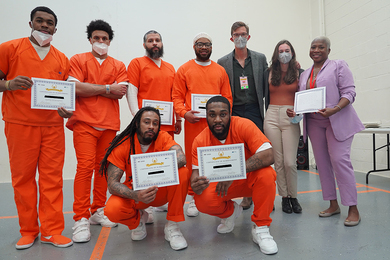In an informal presentation last week at a forum sponsored by the Administrative Advisory Committee (AAC), Executive Vice President John Curry talked about some of his priorities for managing the "business" of MIT: an emphasis on customer service, efficiency in business processes, and development of human resources--the people who work here.
Mr. Curry emphasized that the Institute needs seamless business processes and common tools to ensure continuous improvement in its financial services and systems delivery. It needs to organize to achieve continuous upgrade capability and improvements in end user functionality of its information technology.
He plans to work with administrative and support staff to create a greater sense of community and the potential for the common good through interdepartmental teamwork, to enhance professional networks on campus, and to improve service relationships with students and faculty, he said.
"MIT often seems to think about things in tiny pieces, atoms, yet there are many opportunities for broadly beneficial corporate solutions to business problems. We need to make sure that the whole of MIT is greater than the sum of its parts," Mr. Curry told the AAC--a group of 13 administrative officers which serves as a liaison between MIT's central administration and departments, labs and centers--and other attendees at the forum.
As a means of putting these priorities into practice, Mr. Curry described the establishment of a new organization--Financial Systems Services (FSS). The overall goal of FSS will be to coordinate the development, delivery and maintenance of effective financial systems for the Institute.
This new organization is a successor to the Management Reporting Project, which had a broad change management mandate and was charged with introducing the SAP financial system into MIT. Mr. Curry noted that Management Reporting had been appropriately an ad hoc organization, originally formed as part of MIT's reengineering effort.
Now that SAP has been installed, he said, we need to create a standing organization with deep roots in financial areas such as the Controller's Accounting Office, Procurement, the Office of Sponsored programs and the Budget Office, as well as strong connections to Information Systems, Facilities, and in the future, Human Resources. The proposed new FSS group will bring together people who already have been working in close collaboration to install SAP at MIT.
FSS will continue to support the implementation of SAP, working to ensure that the software increasingly meets the needs of departments, laboratories and centers. The organization will also be responsible for installing appropriate new versions of SAP and related software, and will continue to integrate MIT's business processes.
FSS will be headed by Charles Shaw, currently the Institute auditor, who will report directly to Mr. Curry. Mr. Shaw's staff will consist of representatives from the former reengineering teams, as well as from the Accounting Office, Purchasing, school and area coordinators for SAP, and Information Systems. The FSS will be advised by a Financial Systems Services and Policies Coordinating Council.
Mr. Curry noted that he had asked several senior individuals to work with him to devise an effective standing organization to serve the Institute's systems development and implementation needs: Provost Robert Brown and Assistant Provost Doreen Morris, because of their advocacy of the concerns and needs of the DLCs; Vice President for Human Resources Joan Rice, because implementation of new business processes is more a people issue than a technical one; Vice President and Corporation Secretary Kathryn Willmore because of her vital role in Institute communications; Controller James Morgan and Vice President for Information Systems James Bruce, because the current primary focus is on financial systems; and Community Involvement Team captain Janet Snover, who, on behalf of the group, recorded the many end-user listening sessions during the last three months.
The group, with Mr. Curry as chair, will stay together as a new coordinating council to provide Mr. Shaw and the FSS structural communication pathways among the diverse user community, to prioritize system enhancements and upgrades according to user requirements, and to meter implementations into "digestible bites." "There will be more changes to come, but we won't reorganize just for the sake of reorganizing," Mr. Curry told the AAC.
He also told the group of administrators that he values good working relationships, straight-up honesty, people taking responsibility for their own work as well as each other's, deliverables and performance, accountability and people who accept authority with grace. He is pleased, he said, to find that "at MIT there are no atheists or agnostics about our mission. Our goal is the development of human capital."
Mr. Curry became the executive vice president of MIT on November 9. He holds responsibility for the overall leadership, management and organization of the Institute's administrative and financial affairs, including operations, financial management and planning, human resources management, information systems, resource development and facilities.
Before coming to MIT, he was vice president for business and finance at Caltech and a former senior official at UCLA and the University of Southern California. He holds the BA in physics and the MA in mathematics from West Virginia University. Mr. Curry completed the course work for a doctorate in mathematics from Carnegie Mellon University before turning to the study of organizations as an NIMH Fellow in Organizational Research at Stanford, where he was also a management intern in the Provost's Office.
When asked by a member of MIT's AAC last week to outline his vision for the Institute's administration, Mr. Curry replied, "Visions grow out of cultures and places and traditions. They're informed by new minds, but in significant measure, they will spring from people already in place who find new opportunities to share their visions. And in so many ways, vision is going to be something created for administration by all of us, not just singularly by someone in a new leadership role."
"Reengineering is not quite over," Mr. Curry told the administrators in his March 24 talk. "Use of the word is over, but some of the concepts--like teamwork and emphasis on business process redesign--remain valid."
A version of this article appeared in the March 31, 1999 issue of MIT Tech Talk (Volume 43, Number 24).





